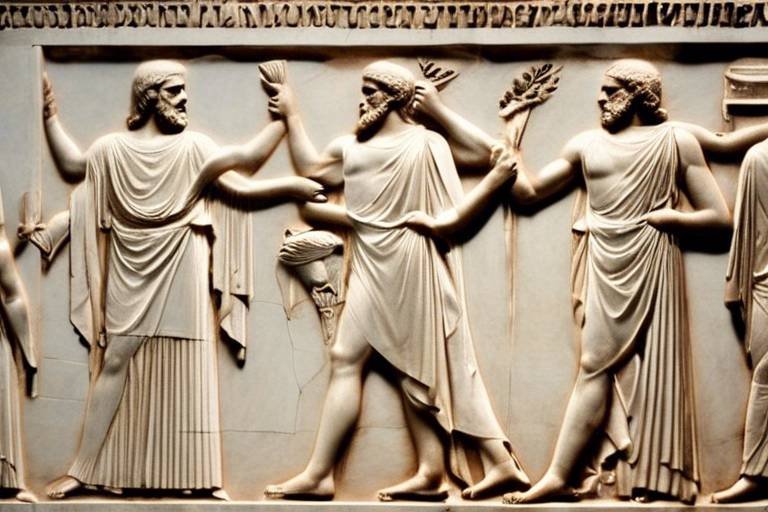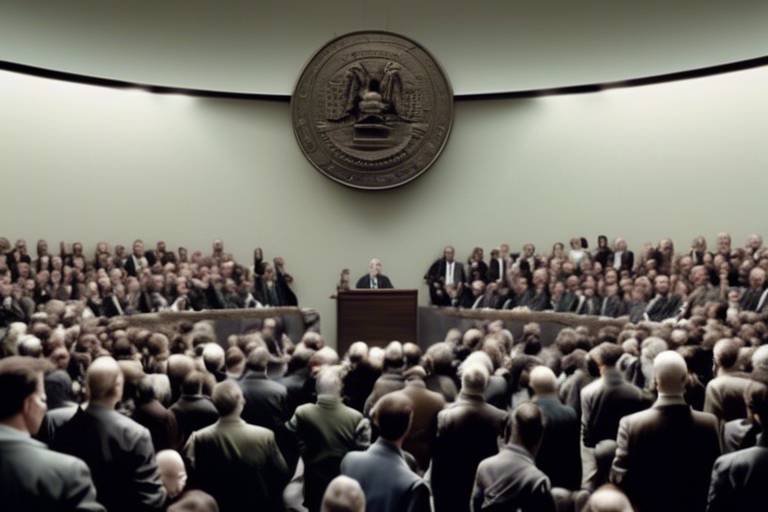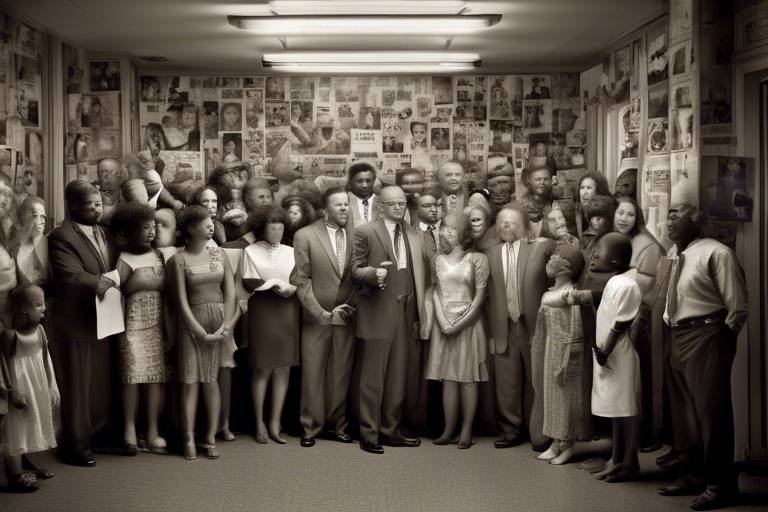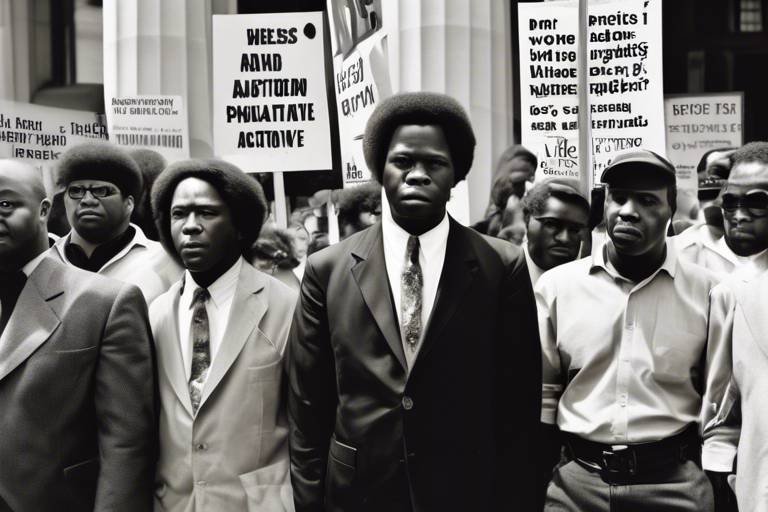The Philosophy and Politics of Human Rights
Human rights are more than just a set of guidelines or legal obligations; they represent the very essence of what it means to be human. In a world that is constantly evolving, the philosophy and politics surrounding human rights play a pivotal role in shaping our societies. But what exactly are human rights? They can be defined as the basic rights and freedoms that belong to every person in the world, from birth until death. These rights are based on shared values like dignity, fairness, equality, and respect. Understanding the intricate relationship between these concepts is essential for grasping how they influence governance and individual freedoms.
At the heart of the human rights discourse lies a rich tapestry of historical events, philosophical theories, and political movements. Each of these elements contributes to our understanding of what human rights are and why they matter. The evolution of human rights is not just a story of progress; it’s also a tale of struggle, conflict, and, at times, regression. So, how did we arrive at our current understanding of human rights? The answer lies in examining the historical milestones that have shaped the development of these rights, including key documents like the Universal Declaration of Human Rights and movements advocating for social justice.
Philosophically, the foundations of human rights are deeply rooted in various theories that explore the nature of rights and their origins. From natural law to social contract theory, these philosophical ideas provide a framework for understanding how rights are perceived and enacted in different societies. For instance, natural law theory suggests that human rights are universal and inherent, existing independently of any government’s recognition. This perspective has influenced legal frameworks around the world, asserting that certain rights are so fundamental that they cannot be taken away.
However, the philosophy of human rights is not without its critics. Some argue that natural law can be subjective and culturally biased, leading to questions about its applicability in diverse societies. This critique raises essential discussions about the universality of human rights and whether they can truly be applied across different cultural contexts. Furthermore, social contract theory introduces another layer of complexity by suggesting that human rights emerge from an implicit agreement among individuals to form a society. This perspective highlights the delicate balance between individual freedoms and collective responsibilities, prompting us to ask: Are our rights truly ours, or do they exist because of a societal agreement?
As we navigate through the political landscape of human rights, it becomes evident that the role of governments is crucial. The intersection of politics and human rights is a double-edged sword; while some governments work tirelessly to uphold these rights, others may violate them for various reasons, including political expediency or cultural norms. This dichotomy significantly impacts social justice and individual freedoms, leading to a myriad of challenges and opportunities for advocacy.
International human rights law serves as a framework that establishes legal standards countries are expected to uphold. These laws are designed to protect individuals from abuses and hold states accountable for violations against their citizens. Yet, despite the existence of these laws, enforcing human rights remains a daunting challenge. Political resistance, cultural differences, and the complexities of international relations often hinder progress in global human rights advocacy.
In conclusion, the philosophy and politics of human rights are interwoven in a complex dance that influences our understanding of justice, governance, and individual freedoms. As we continue to explore these themes, it is vital to remain vigilant and advocate for a world where human rights are not just recognized but actively upheld and celebrated.
- What are human rights? Human rights are basic rights and freedoms that belong to every person, regardless of nationality, sex, ethnicity, or religion.
- Why are human rights important? They are essential for ensuring dignity, equality, and justice for all individuals in society.
- How do philosophical theories influence human rights? Philosophical theories like natural law and social contract theory provide foundational ideas that shape our understanding and implementation of human rights.
- What role do governments play in human rights? Governments are responsible for upholding human rights laws and protecting individuals from abuses. However, some may also violate these rights.

The Historical Context of Human Rights
This article explores the intricate relationship between human rights, their philosophical foundations, and the political implications they carry in contemporary society, examining how these concepts shape governance and individual freedoms.
Understanding the evolution of human rights requires examining historical milestones that have shaped their development, including key documents and movements that have influenced modern interpretations and implementations. The journey of human rights is akin to a winding river, where each bend and curve represents significant events that have contributed to the flow of rights as we know them today. From ancient civilizations to modern democracies, the concept of human rights has been molded by cultural, social, and political forces.
One of the earliest recorded instances of human rights can be traced back to the Cyrus Cylinder in 539 BCE, which is often regarded as the first charter of human rights. This ancient artifact from Persia proclaimed the rights of individuals, including the freedom to practice their religion. Fast forward to 1215, when the Magna Carta was signed in England, establishing the principle that everyone, including the king, was subject to the law. This document laid the groundwork for modern legal systems and the notion that individuals have rights that must be respected.
The Enlightenment period in the 17th and 18th centuries marked another pivotal moment in the history of human rights. Thinkers like John Locke and Jean-Jacques Rousseau argued for the inherent rights of individuals, emphasizing liberty, equality, and fraternity. Their ideas sparked revolutions, most notably the American Revolution in 1776 and the French Revolution in 1789, which both sought to establish governments that recognized and protected individual rights.
As we moved into the 20th century, the horrors of World War II and the Holocaust prompted a global reckoning with human rights. In response, the Universal Declaration of Human Rights (UDHR) was adopted by the United Nations General Assembly in 1948. This landmark document articulated a comprehensive set of rights that every individual should enjoy, regardless of nationality, ethnicity, or religion. It is often considered a milestone in the fight for human dignity and justice.
Throughout the latter half of the 20th century and into the 21st century, various movements have emerged, advocating for the rights of marginalized groups, including women, racial minorities, and LGBTQ+ individuals. The civil rights movement in the United States, the anti-apartheid struggle in South Africa, and the global fight for gender equality are just a few examples of how the historical context of human rights continues to evolve.
To summarize, the historical context of human rights is a tapestry woven from diverse threads of culture, philosophy, and political action. Each significant event and document has contributed to our current understanding of what it means to have rights. As we reflect on this history, it's crucial to recognize that the fight for human rights is ongoing, and the lessons of the past inform our present and future endeavors.
- What are human rights? Human rights are fundamental rights and freedoms that belong to every person, regardless of nationality, sex, ethnicity, religion, or any other status.
- Why are historical milestones important in understanding human rights? Historical milestones provide context and illustrate how human rights have evolved over time, influencing contemporary laws and societal norms.
- How does the Universal Declaration of Human Rights impact modern society? The UDHR serves as a foundational document that guides nations in creating laws and policies that protect the rights of individuals.

Philosophical Foundations of Human Rights
The philosophical foundations of human rights are essential for understanding their significance and application in our world today. These foundations are not just abstract concepts; they are deeply rooted in our moral fabric and societal structures. When we talk about human rights, we’re diving into a sea of ideas that have evolved through centuries of thought, debate, and struggle. So, what exactly are these philosophical underpinnings? Let's explore!
At the heart of the discussion are two primary theories: natural law and social contract theory. Each offers a unique lens through which we can view human rights and their implications for society. Natural law suggests that human rights are inherent and universal, grounded in moral principles that exist independently of any government or legal system. This idea resonates with many because it implies that rights are not granted by authorities but are instead an intrinsic part of our humanity.
On the other hand, social contract theory posits that human rights arise from an implicit agreement among individuals to form a society. This perspective emphasizes the balance between individual freedoms and collective responsibilities. In essence, it argues that while we have rights, we also have duties to one another. This interplay between rights and responsibilities is crucial for maintaining a just society.
Natural law theory has been championed by various philosophers throughout history, notably John Locke and Thomas Aquinas. Locke argued that individuals possess certain inalienable rights, such as life, liberty, and property, which governments must respect. His ideas laid the groundwork for modern democratic thought and the belief that individuals have rights that cannot be surrendered or taken away.
Aquinas, on the other hand, framed natural law within a theological context, suggesting that our moral principles are derived from a divine source. This perspective has influenced many religious and legal systems, reinforcing the notion that human rights are not merely societal constructs but are anchored in a higher moral order.
Examining the contributions of these key philosophers reveals how their thoughts have shaped our understanding of rights:
| Philosopher | Key Contributions |
|---|---|
| John Locke | Proposed the idea of inalienable rights and the social contract. |
| Thomas Aquinas | Integrated natural law with moral and theological principles. |
However, not everyone is on board with natural law. Critics argue that it can be subjective and culturally biased. What one society views as a fundamental right, another may see as irrelevant or even harmful. This raises important questions about the universality of human rights and their applicability across diverse cultures. Can we truly claim that certain rights are universal when different societies have differing values and norms? This debate is ongoing and highlights the complexities involved in defining and advocating for human rights globally.
Shifting gears to social contract theory, this approach emphasizes the idea that rights are not just given but are part of an agreement among individuals to coexist peacefully. Think of it like a team sport: everyone has their role, and while players have individual skills, they also have responsibilities to their teammates. In a similar vein, social contract theory suggests that our rights are balanced by our responsibilities to society.
This theory has profound implications for governance and law. It suggests that the legitimacy of authority comes from its ability to protect the rights of its citizens while ensuring that individuals contribute to the common good. In this sense, human rights are not just about individual freedoms; they are also about the health and stability of the community as a whole.
In conclusion, the philosophical foundations of human rights are rich and complex, offering various perspectives that continue to shape our understanding of justice, governance, and individual dignity. Whether through the lens of natural law or social contract theory, these ideas challenge us to think critically about our rights and responsibilities in a rapidly changing world.
- What are human rights? Human rights are the basic rights and freedoms that belong to every person in the world, from birth until death.
- Why are philosophical foundations important? They help us understand the origins and justifications of human rights, guiding their application and interpretation in society.
- How do natural law and social contract theory differ? Natural law focuses on inherent rights based on moral principles, while social contract theory emphasizes rights arising from societal agreements.
- Can human rights be universal? This is a contentious issue, as different cultures may have varying interpretations of what constitutes a right.

Natural Law and Human Rights
Natural law theory is a fascinating and profound aspect of the discussion surrounding human rights. At its core, this theory posits that human rights are not merely constructs of society or government but are inherent and universal. They are derived from moral principles that exist independently of any legal or political recognition. Imagine for a moment a world where rights are not granted by a state but are simply recognized as part of our humanity. This idea forms the backbone of many contemporary human rights frameworks and legal systems around the globe, influencing everything from constitutions to international treaties.
The appeal of natural law lies in its assertion that certain rights are fundamental to human dignity. For instance, the right to life, liberty, and the pursuit of happiness are often viewed as universal rights that should be afforded to every individual, regardless of their nationality or cultural background. This universality is critical because it challenges governments and societies to uphold these rights, even when it may not be politically expedient. Think of natural law as a moral compass, guiding societies toward justice and equality.
Key philosophers have played a pivotal role in shaping the discourse around natural law and human rights. Figures like John Locke and Thomas Aquinas have made significant contributions to our understanding of these concepts. Locke, for example, argued that individuals possess certain inalienable rights that cannot be surrendered or transferred, which laid the groundwork for modern democratic ideals. Aquinas, on the other hand, emphasized the connection between natural law and divine law, suggesting that moral principles are rooted in a higher order. Their ideas have not only influenced philosophical thought but have also had a lasting impact on legal systems worldwide.
However, the theory of natural law is not without its critiques. Some argue that it can be subjective and culturally biased, raising questions about its applicability in diverse societies. For instance, what is considered a 'natural right' in one culture may not hold the same weight in another. This subjectivity can lead to significant challenges in the implementation and enforcement of human rights laws. Critics suggest that we need to be cautious about assuming a one-size-fits-all approach to human rights based on natural law, as it may overlook the rich tapestry of cultural differences that exist globally.
Despite these critiques, the influence of natural law on contemporary human rights discourse remains profound. It serves as a reminder that human rights are not merely privileges granted by governments but are inherent to our existence as human beings. This perspective encourages a more robust dialogue about the responsibilities of states and individuals in upholding these rights. In essence, natural law not only informs our understanding of what rights we possess but also compels us to advocate for their recognition and protection in every corner of the globe.
- What is natural law? Natural law is a philosophical belief that certain rights are inherent and universal, existing independently of governmental recognition.
- How does natural law relate to human rights? Natural law provides a moral foundation for human rights, suggesting that they are fundamental to human dignity and should be protected by society.
- Who are the key philosophers associated with natural law? Prominent philosophers include John Locke and Thomas Aquinas, whose ideas have significantly shaped the understanding of rights.
- What are the critiques of natural law? Critics argue that natural law can be subjective and culturally biased, raising concerns about its applicability in diverse societies.

Key Philosophers of Natural Law
When we delve into the realm of natural law and its influence on human rights, we cannot overlook the profound contributions made by several key philosophers. These thinkers have laid the groundwork for understanding rights as not merely legal constructs but as inherent to human existence. At the forefront of this philosophical movement are figures such as John Locke and Thomas Aquinas, whose ideas have shaped our contemporary notions of rights and justice.
John Locke, often heralded as the father of liberalism, introduced the idea that individuals possess certain inalienable rights simply by virtue of being human. In his seminal work, Two Treatises of Government, Locke argued that life, liberty, and property are fundamental rights that must be protected by governments. He believed that the primary role of government is to safeguard these rights, and when a government fails to do so, citizens are justified in overthrowing it. This revolutionary idea not only influenced the founding principles of modern democracies but also laid the groundwork for later human rights declarations.
On the other hand, Thomas Aquinas brought a different dimension to natural law by integrating it with Christian theology. He posited that natural law is part of a divine order, accessible through human reason. According to Aquinas, moral principles derived from natural law are universal and should guide human behavior. He categorized laws into four types: eternal law, natural law, human law, and divine law, emphasizing that human laws must align with natural law to be just. This perspective has been pivotal in discussions about the moral basis of human rights, suggesting that our rights are not just social agreements but are grounded in a higher moral order.
While these philosophers have significantly contributed to the discourse on natural law, it's essential to recognize the criticisms that have emerged regarding their views. Some argue that natural law can be overly subjective, leading to varying interpretations that may not be universally applicable. For instance, different cultures may have distinct moral frameworks that challenge the universality of natural rights as proposed by Locke and Aquinas. This raises important questions about how we define and enforce human rights across diverse societies.
In summary, the contributions of Locke and Aquinas to the philosophy of natural law have profoundly influenced our understanding of human rights. Their ideas continue to resonate in contemporary debates about justice, governance, and individual freedoms. As we navigate the complexities of modern society, reflecting on these philosophical foundations helps us appreciate the ongoing struggle for human rights and the moral imperatives that drive it.
- What is natural law? Natural law is a philosophical concept suggesting that certain rights are inherent and universal, derived from moral principles that exist independently of government recognition.
- Who are the key philosophers associated with natural law? Key philosophers include John Locke, who emphasized inalienable rights, and Thomas Aquinas, who integrated natural law with Christian theology.
- How does natural law influence modern human rights? Natural law provides a moral foundation for human rights, asserting that these rights are fundamental to human dignity and must be protected by governments.
- Are there criticisms of natural law? Yes, critics argue that natural law can be subjective and culturally biased, raising questions about its applicability in diverse societies.

Critiques of Natural Law
While natural law theory has been a cornerstone in the discussion of human rights, it is not without its fair share of critiques. Detractors often argue that the concept of natural law can be too subjective. After all, if rights are considered inherent and universal, who gets to define what those rights are? This ambiguity raises significant questions about how these rights can be applied consistently across different cultures and societies. For instance, what may be considered a fundamental right in one country could be viewed differently in another, leading to a myriad of interpretations.
Moreover, critics point out that natural law can inadvertently uphold existing power structures. If a society's dominant group gets to determine the moral principles that underpin natural law, it may perpetuate inequalities. This is particularly troubling in cases where marginalized groups find their rights overlooked or dismissed, as the prevailing moral framework may not reflect their experiences or needs. The question then arises: can a theory that claims universality truly be universal if it often fails to encompass diverse perspectives?
Another significant critique revolves around the applicability of natural law in modern legal systems. In an increasingly pluralistic world, where multiple belief systems coexist, relying on a singular moral framework can lead to tension and conflict. Critics argue that natural law’s rigid structure may not be adaptable enough to address the complexities of contemporary issues, such as digital privacy, environmental rights, and global migration. This inflexibility can hinder the evolution of human rights laws that need to be responsive to societal changes.
To illustrate these critiques further, consider the following table that summarizes some of the major arguments against natural law:
| Critique | Description |
|---|---|
| Subjectivity | Natural law can be interpreted differently across cultures, leading to inconsistencies. |
| Power Dynamics | It may reinforce existing inequalities by allowing dominant groups to define moral principles. |
| Inflexibility | Rigid adherence to natural law may not adapt well to modern, complex societal issues. |
In conclusion, while natural law provides a foundational perspective on human rights, it is essential to engage with its critiques. Recognizing the limitations and challenges posed by this theory can foster a more nuanced understanding of human rights, encouraging dialogue that is inclusive of diverse perspectives. As we navigate the ever-evolving landscape of rights and freedoms, it becomes crucial to seek frameworks that not only uphold dignity but also adapt to the complexities of human experience.
- What is natural law? Natural law is a theory suggesting that human rights are inherent and universal, derived from moral principles that exist independently of governmental recognition.
- Why is natural law criticized? Critics argue that natural law can be subjective, uphold existing power structures, and may not be adaptable to modern societal complexities.
- How does natural law influence human rights? Natural law provides a philosophical foundation for human rights, emphasizing the idea that certain rights are fundamental to human dignity.
- Can natural law coexist with other legal frameworks? Yes, but it often requires careful balancing to ensure that diverse perspectives are respected and included.

Social Contract Theory and Human Rights
Social contract theory is a fascinating concept that delves into the origins of human rights and the relationship between individuals and society. Imagine a time before governments, where people lived in a state of nature, free but often chaotic. In this scenario, individuals realized that to enjoy their freedoms and ensure their safety, they needed to come together and form a society. This is where the idea of a social contract comes into play. It's an implicit agreement among individuals to surrender some of their freedoms in exchange for the protection of their remaining rights.
The beauty of social contract theory lies in its emphasis on the balance between individual freedoms and collective responsibilities. Think of it as a dance: while everyone wants to express their unique moves, they must also be mindful of their partner to keep the rhythm going. This balance is crucial because it acknowledges that while we have the right to live freely, our actions can impact others, and thus, we must consider the greater good.
Several philosophers have contributed to this discourse, with notable figures like Jean-Jacques Rousseau, Thomas Hobbes, and John Locke offering differing perspectives. For instance, Hobbes believed that in the state of nature, life would be "solitary, poor, nasty, brutish, and short," prompting individuals to agree to a strong central authority to maintain order. In contrast, Locke viewed the social contract as a means to protect natural rights—life, liberty, and property—arguing that if a government fails to uphold these rights, the people have the right to revolt.
Through this lens, human rights can be seen as the fundamental entitlements that arise from the social contract. These rights are not merely granted by governments but are inherent to individuals as part of their agreement to coexist peacefully. This perspective has profound implications for how we view governance today. If a government violates these rights, it not only breaks the social contract but also undermines its legitimacy. This raises the question: how do we hold governments accountable for their actions?
In practice, the concept of social contract theory informs various legal and political frameworks around the world. For example, many democratic nations incorporate the principles of social contract theory into their constitutions, ensuring that citizens have a voice in governance and that their rights are protected. However, the challenge remains in ensuring that these rights are upheld consistently. Political leaders must navigate the delicate balance between maintaining order and respecting individual freedoms, often facing criticism when this balance tips too far in one direction.
Ultimately, social contract theory serves as a foundation for understanding human rights in a modern context. It invites us to reflect on our roles as citizens and the responsibilities we share in protecting not just our rights, but the rights of others as well. As we continue to grapple with issues of justice and equality, the principles of the social contract remind us that our freedoms are intertwined, and safeguarding them is a collective endeavor.
- What is social contract theory? - Social contract theory posits that individuals consent to form a society and establish a government to protect their rights and maintain order.
- Who are the key philosophers associated with social contract theory? - Notable philosophers include Thomas Hobbes, John Locke, and Jean-Jacques Rousseau, each offering unique perspectives on the nature of the social contract.
- How do human rights relate to social contract theory? - Human rights are seen as inherent entitlements that arise from the social contract, meant to be protected by the government.
- What happens if a government violates the social contract? - If a government fails to uphold the rights of its citizens, it undermines its legitimacy, and the people may have the right to revolt.

The Political Landscape of Human Rights
The intersection of politics and human rights is not just a mere academic concept; it is a vibrant, dynamic arena where the ideals of freedom, justice, and dignity come into direct conflict with the realities of governance. In many ways, the political landscape shapes the very fabric of human rights, determining who gets to enjoy these rights and who does not. It's a bit like a game of chess, where each move by a government can either advance the cause of human rights or set it back several steps. Have you ever wondered how laws designed to protect individual freedoms can be manipulated or ignored? This is where the complexities of political power come into play.
At the heart of this political landscape lies international human rights law, which establishes a set of legal standards that countries are expected to uphold. These laws are not merely suggestions; they are binding agreements that hold states accountable for their actions. However, the effectiveness of these laws often hinges on the political will of those in power. For instance, while many countries have ratified international treaties, the implementation of these laws can be inconsistent. Some governments may choose to ignore their obligations, prioritizing political expediency over human dignity. This discrepancy raises important questions: How can we ensure that human rights are not just theoretical ideals but practical realities for everyone?
Moreover, the enforcement of human rights laws is fraught with challenges. Political resistance is a significant barrier, as governments may resist external pressure to change their policies. Cultural differences also play a crucial role; what one society views as a fundamental human right, another may see as a violation of tradition or sovereignty. This tension complicates the global dialogue on human rights and can lead to a fragmented understanding of what these rights entail. It’s like trying to find common ground in a heated debate—everyone has their own perspective, and reaching a consensus can feel nearly impossible.
Despite these challenges, the pursuit of human rights continues to evolve. Activists and organizations around the world are working tirelessly to hold governments accountable, often at great personal risk. They remind us that the political landscape is not static; it is constantly shifting, influenced by social movements, public opinion, and international pressure. The rise of social media has also transformed how human rights issues are addressed, allowing for real-time reporting and mobilization of support. In this digital age, the power of a tweet or a hashtag can amplify voices that have long been silenced.
To illustrate the complexities of this political landscape, consider the following table that highlights some key international human rights treaties and their impact:
| Treaty | Year Adopted | Key Focus | Impact |
|---|---|---|---|
| Universal Declaration of Human Rights | 1948 | Fundamental human rights | Serves as a foundation for international human rights law |
| Covenant on Civil and Political Rights | 1966 | Political rights and freedoms | Establishes rights like freedom of speech and assembly |
| Covenant on Economic, Social and Cultural Rights | 1966 | Economic and social rights | Recognizes rights to education, health, and an adequate standard of living |
| Convention on the Elimination of All Forms of Discrimination Against Women | 1979 | Gender equality | Promotes women's rights and gender equality globally |
In conclusion, the political landscape of human rights is a complex and often contentious arena. As we navigate through this intricate web of laws, cultures, and political agendas, it’s crucial to remember that the struggle for human rights is far from over. Each of us has a role to play in advocating for these rights, whether through activism, education, or simply by staying informed. After all, what good are rights if they are not actively defended and upheld?
- What are human rights? Human rights are fundamental rights and freedoms to which all individuals are entitled, regardless of nationality, sex, ethnicity, or religion.
- Why are human rights politically significant? Human rights are significant because they influence governance, social justice, and the relationship between individuals and the state.
- How can individuals advocate for human rights? Individuals can advocate for human rights by raising awareness, supporting organizations, and participating in peaceful protests and campaigns.

International Human Rights Law
International human rights law is a framework that establishes a set of legal standards aimed at promoting and protecting the fundamental rights and freedoms of individuals worldwide. This body of law is primarily derived from various international treaties, conventions, and customary international law, which obligate states to uphold certain rights and ensure their citizens are treated with dignity and respect. At its core, international human rights law seeks to create a universal standard that transcends cultural and national boundaries, recognizing that every individual is entitled to certain basic rights simply by being human.
One of the most significant milestones in the development of international human rights law was the adoption of the Universal Declaration of Human Rights (UDHR) in 1948. This landmark document, drafted by the United Nations General Assembly, outlines a broad range of rights that are considered essential for the dignity of all people. The UDHR has inspired numerous international treaties and national laws, serving as a foundation for human rights advocacy around the globe.
Some key components of international human rights law include:
- Civil and Political Rights: These rights protect individual freedoms, such as the right to life, freedom of speech, and the right to privacy. They are enshrined in treaties like the International Covenant on Civil and Political Rights (ICCPR).
- Economic, Social, and Cultural Rights: These encompass rights related to work, education, health, and an adequate standard of living, as outlined in the International Covenant on Economic, Social and Cultural Rights (ICESCR).
- Rights of Specific Groups: International law also recognizes the rights of vulnerable populations, including women, children, indigenous peoples, and persons with disabilities, ensuring their protection and empowerment.
Furthermore, the enforcement of international human rights law is overseen by various international bodies, such as the United Nations Human Rights Council and regional organizations like the European Court of Human Rights. These institutions monitor compliance, investigate violations, and provide mechanisms for accountability. However, the enforcement of these laws can be quite challenging. Political resistance from states, cultural differences, and the complexities of international relations often hinder the effectiveness of human rights protections.
In recent years, the landscape of international human rights law has expanded to include issues such as climate change and digital rights, reflecting the evolving nature of human rights in the face of global challenges. As we navigate a rapidly changing world, the commitment to uphold and advance human rights remains a critical aspect of ensuring justice and equality for all.
Q: What is the Universal Declaration of Human Rights?
A: The Universal Declaration of Human Rights (UDHR) is a foundational document adopted by the United Nations in 1948 that outlines the fundamental rights and freedoms to which all individuals are entitled.
Q: How does international human rights law differ from national law?
A: International human rights law is a set of legal standards that countries agree to uphold on a global scale, while national law pertains to the legal frameworks established within individual countries. International law serves as a guideline, but enforcement often relies on national legal systems.
Q: What are some challenges to enforcing international human rights law?
A: Challenges include political resistance from governments, cultural differences that may affect the interpretation of rights, and the complexities of international relations that can hinder accountability and enforcement.

Challenges to Human Rights Enforcement
The enforcement of human rights is a complex and multifaceted challenge that transcends borders and cultures. Despite the existence of international laws and agreements aimed at protecting these rights, various obstacles hinder effective implementation. One of the primary challenges is the political resistance that often arises within governments. Many states prioritize their sovereignty and political agendas over human rights commitments, leading to selective enforcement or outright violations. This creates a paradox where laws exist on paper, but their practical application is inconsistent at best.
Moreover, cultural differences play a significant role in shaping perceptions of human rights. What may be considered a fundamental right in one culture can be viewed differently in another. This divergence can lead to conflicts and misunderstandings, complicating international dialogue and cooperation. For instance, issues surrounding freedom of expression can clash with cultural norms in certain societies, creating a rift between universal human rights and local traditions.
Another critical factor is the complexity of international relations. Countries often find themselves in a delicate balancing act, weighing their diplomatic relationships against the need to uphold human rights. This can result in selective intervention, where international bodies may choose to act only in situations that align with political interests rather than addressing all violations equally. Consequently, this selective approach undermines the universality of human rights and can lead to a perception of hypocrisy in global governance.
Additionally, the lack of resources for monitoring and enforcing human rights can be a significant barrier. Many nations, especially developing ones, struggle with limited financial and human resources, making it difficult to implement comprehensive human rights programs. This scarcity often leads to inadequate training for law enforcement and judicial officials, which can perpetuate a cycle of abuse and neglect.
To illustrate these points, consider the following table that outlines some of the primary challenges to human rights enforcement:
| Challenge | Description |
|---|---|
| Political Resistance | Governments may prioritize political agendas over human rights, leading to violations. |
| Cultural Differences | Diverse cultural perceptions can create conflicts in the interpretation of rights. |
| International Relations | Political interests may dictate selective enforcement of human rights laws. |
| Lack of Resources | Limited funding and training hinder effective human rights monitoring and enforcement. |
In summary, the challenges to human rights enforcement are deeply rooted in political, cultural, and economic factors. Overcoming these obstacles requires a concerted effort from the international community, including a commitment to dialogue, understanding, and the equitable application of human rights laws. Only then can we hope to create a world where human rights are universally respected and upheld.
- What are the main obstacles to enforcing human rights? The main obstacles include political resistance, cultural differences, complexities in international relations, and a lack of resources for monitoring and enforcement.
- How do cultural differences impact human rights? Cultural differences can lead to varying interpretations of what constitutes a human right, creating conflicts and complicating international cooperation.
- Why do some countries fail to uphold human rights? Countries may prioritize their political agendas, face resource limitations, or encounter international pressures that affect their commitment to human rights.
Frequently Asked Questions
- What are human rights?
Human rights are fundamental rights and freedoms that belong to every person, regardless of nationality, sex, ethnicity, language, religion, or any other status. They are based on principles of dignity, equality, and mutual respect.
- How did human rights evolve over time?
The evolution of human rights has been shaped by various historical milestones, including significant documents like the Magna Carta, the Declaration of Independence, and the Universal Declaration of Human Rights. Each of these has played a crucial role in advancing the recognition and protection of individual rights.
- What is the philosophical basis for human rights?
Human rights are grounded in various philosophical theories, most notably natural law and social contract theory. Natural law suggests that rights are inherent and universal, while social contract theory posits that rights arise from an agreement among individuals to form a society.
- Who are some key philosophers associated with human rights?
Philosophers like John Locke and Thomas Aquinas have significantly influenced the concept of human rights. Their ideas emphasize the importance of individual dignity and moral order, forming the backbone of many modern human rights frameworks.
- What challenges exist in enforcing human rights?
Enforcing human rights can be incredibly challenging due to political resistance, cultural differences, and the complexities of international relations. These factors can impede progress and make it difficult to hold governments accountable for violations.
- What role does international law play in human rights?
International human rights law sets legal standards that countries are expected to adhere to, influencing domestic policies and providing mechanisms for accountability. It serves as a framework for protecting individuals against abuses by their governments.
- Can human rights be culturally relative?
While some argue that human rights should be interpreted within cultural contexts, others believe that fundamental rights are universal and should not be subject to cultural variations. This debate continues to be a significant point of contention in human rights discourse.



















